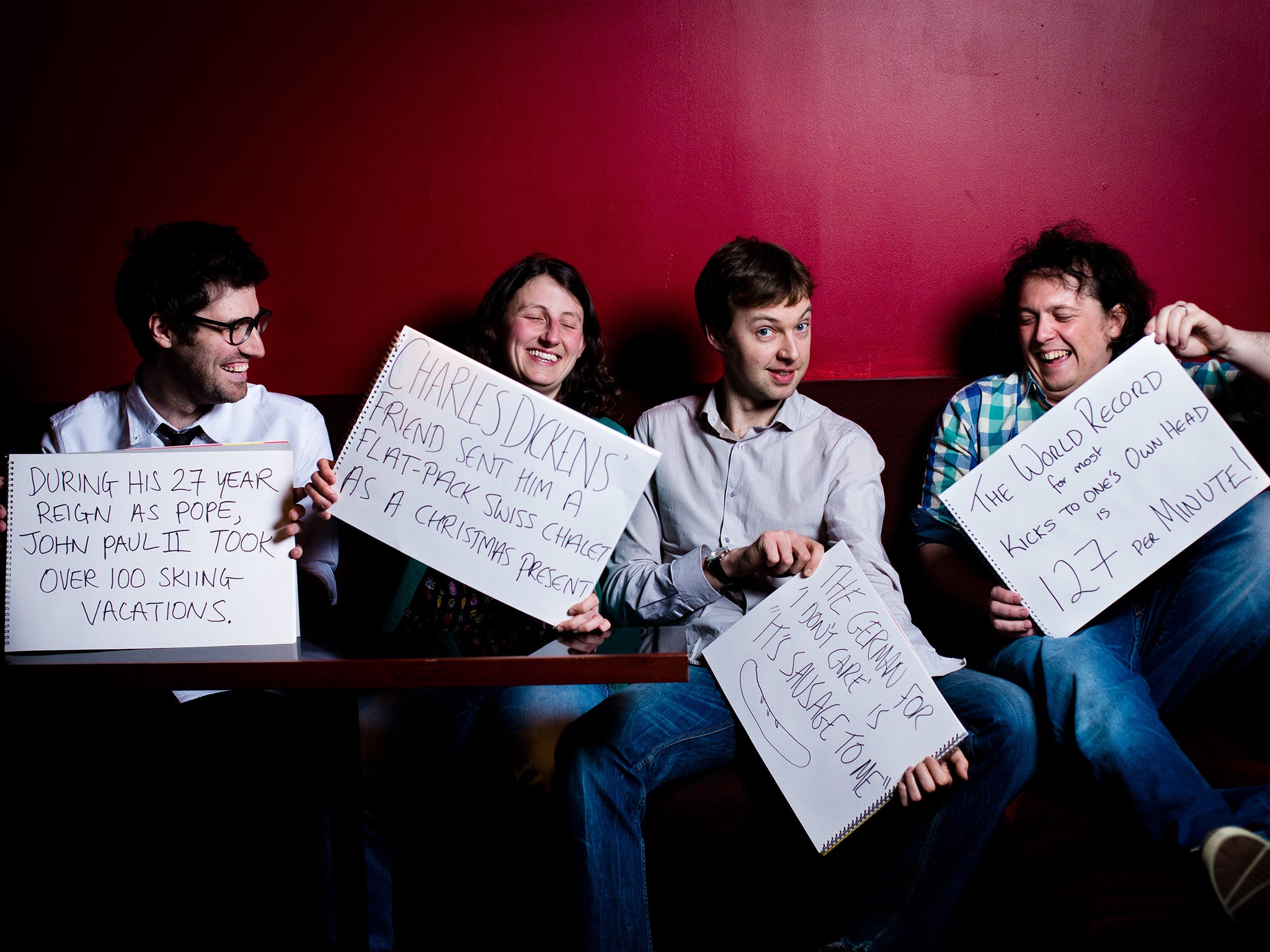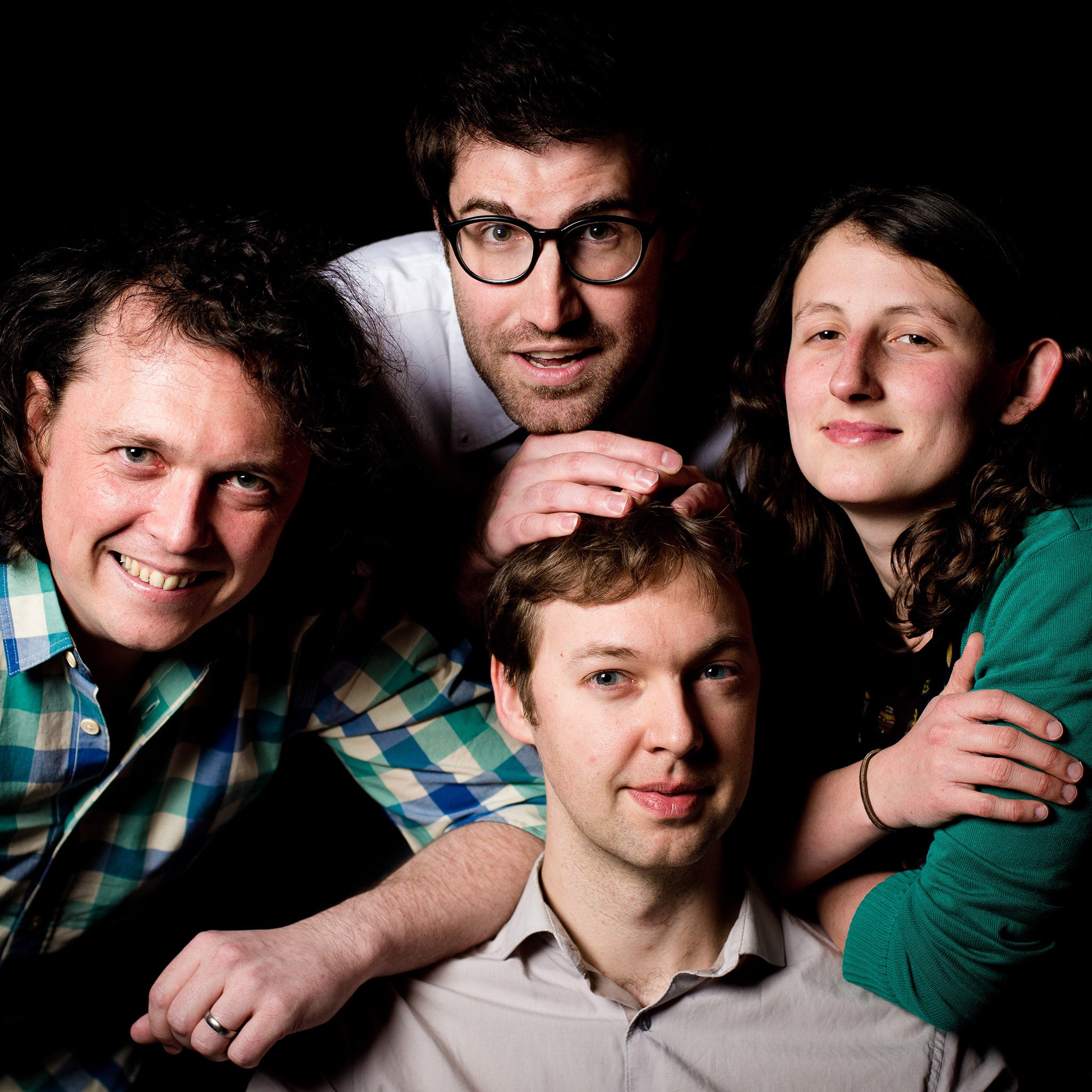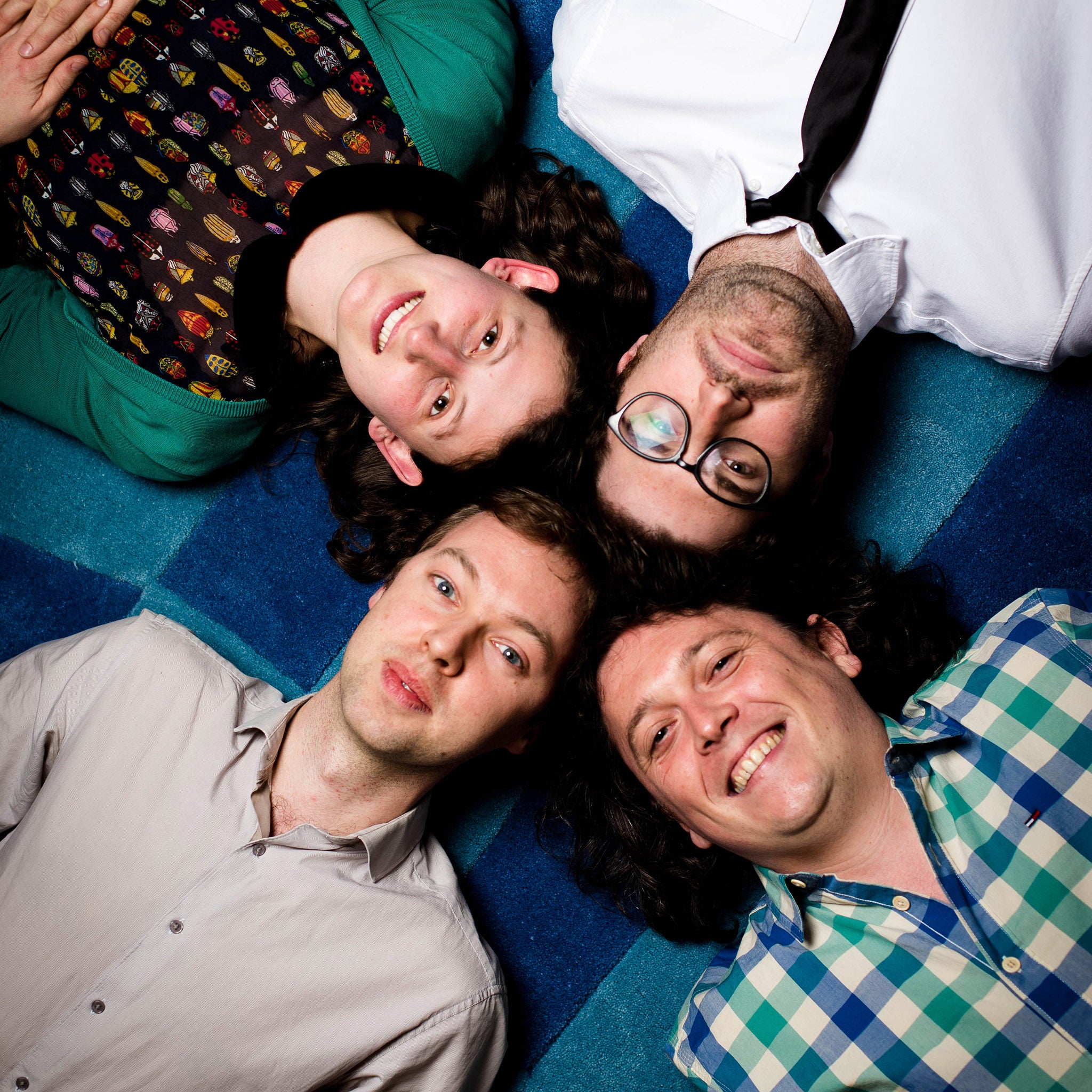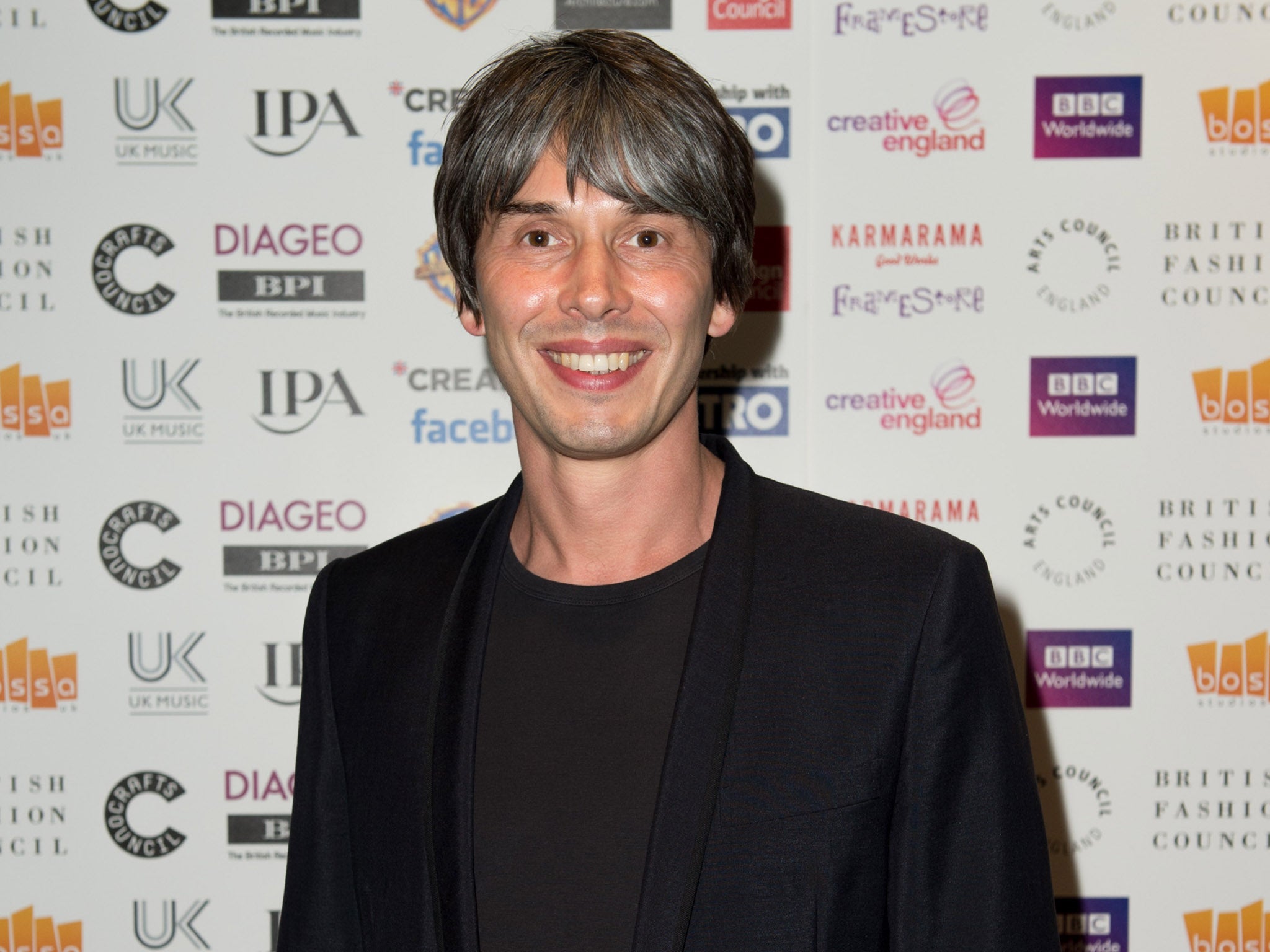The QI Elves: The fact-finding overlords with their own hit podcast
QI researchers the ‘elves’ on their new show No Such Thing as a Fish and how 'everything in history is a Monty Python Sketch'

Your support helps us to tell the story
From reproductive rights to climate change to Big Tech, The Independent is on the ground when the story is developing. Whether it's investigating the financials of Elon Musk's pro-Trump PAC or producing our latest documentary, 'The A Word', which shines a light on the American women fighting for reproductive rights, we know how important it is to parse out the facts from the messaging.
At such a critical moment in US history, we need reporters on the ground. Your donation allows us to keep sending journalists to speak to both sides of the story.
The Independent is trusted by Americans across the entire political spectrum. And unlike many other quality news outlets, we choose not to lock Americans out of our reporting and analysis with paywalls. We believe quality journalism should be available to everyone, paid for by those who can afford it.
Your support makes all the difference.Everything is quite interesting. Or at least, it is when you’re a fact-hungry QI “elf” – one of the researchers behind the phenomenally popular and enduring BBC panel show. Spending their days trawling the internet and reference books, while keeping their ears pricked in everyday conversations, they are the show’s real brains, even if Stephen Fry gets to take the credit for their work on screen.
Though now, thanks to No Such Thing as a Fish – a weekly spin-off podcast launched by four of the elves last year – they are becoming stars in their own right. It sees them agree on four facts, which serve as a starting point for individual research missions, as they try to outdo each other with the silly, fascinating or just plain weird knowledge they’ve acquired. And there’s a big appetite for information about Tutankhamun’s mummified erection or the inventor of Shredded Wheat, it seems – one of Britain’s most popular podcasts, NSTAAF has been listened to more than seven million times in the year since its launch. It’s such a hit, they’ve even moved to the live stage: the quartet of Andy Hunter Murray, Dan Schreiber, James Harkin, and Anna Ptaszynski have a residency at the Soho Theatre, recording the podcast in front of a nerdily enthusiastic crowd.
Ptaszynski insists they’re much less cool than any-thing else on at the venue, but Schreiber is quick to point out that entertainment for the intellectually curious is on the rise: from TED talks to events such as Science Showoff and Festival of the Spoken Nerd. Another popular podcast, The Infinite Monkey Cage, is currently touring the US. How different is recording the podcast live, then? It makes it funnier, the elves agree. That’s not always a good thing – an interesting but not-very-chucklesome fact can fall flat. But, Murray muses, “good facts do [usually] have comedy potential, strangely. It’s because they change the way you look at the world.”
They first recorded NSTAAF live last autumn; Schreiber and Murray were keen –they’ve also performed stand-up and improv – but Harkin and Ptaszynski were wary. Ptaszynski gets teased for loosening up mid-show, once she’s sunk half a pint, which leads us into a digression about how Charles Dickens used to drink a pint of champagne before going on stage – a tactic the elves tried once, with head-swimming results.

To get a taste of the intellectual hi-jinx, I joined them for their weekly planning meeting. There’s debate over whether the Hong Kong marathon (contestants run the same mile 26 times), Moon quakes (like earthquakes, but on the Moon) or the true length of the metre (it was miscalculated; metres are 0.2mm shorter than they ought to be) will make strong jumping-off points.
The podcast has been going for exactly a year, and came about because the QI team were aware there was a lot of weird and wonderful research not getting used in the television show. As an example, the quartet recall a time when Harkin jumped in with an inspired – and utterly conversation re-routing – fact about grey whales. “A lot of sea serpents from history turned out to be grey whale penises on the surface of the sea,” explains Harkin. “It’s because grey whales always mate in threesomes – two males and one female – so there’s always one penis flapping around. If you google ‘grey whale penis’ you will see they look a lot like sea serpents .…”
Each of the elves will come to the podcast recording with research notes: Harkin has a single sheet of paper, while Murray, who also writes for Private Eye, opts for a 20-page dossier (“If you’re over-prepared, you’re prepared!” he says). But, chugging through around 75 facts per episode, they so rapidly go off-topic that many are plucked from their memories. How important is accuracy, then? Are they walking encyclopaedias with perfect recall?

Harkin acknowledges that he might forget an exact percentage or number, but says that mentally leafing through facts is second nature after 10 years as a QI researcher. And he was clearly born for the job; Schreiber recounts how QI had message boards allowing enthusiastic amateur fact-collectors to pitch in – and that was how the production team first encountered Harkin, then an accountant whose job left him with a lot of thumb-twiddling time. Unlike Ptaszynski and Murray, who badgered their way into the QI universe as eager young graduates on work experience, Harkin took some persuading to give up the day-job.
“But you love interesting facts – wasn’t it like, ‘this is my dream!’?” laughs Ptaszynski. “Accountancy is rubbish! I can’t believe you considered sticking with accountancy.” The four have the easy intimacy of squabbling siblings – quick to riff on each other’s material and tease each other mercilessly.
Harkin and Ptaszynski are currently engaged in a battle over whether one potential starting fact is reliable enough to use. “A man called Mr Blanket invented the blanket,” says Ptaszynski with understandable delight. “There’s an early 19th-century historian who references a letter from the 1300s that said Mr Blanket invented the blanket ... but James thinks it’s bollocks.” “I’ve been doing [this job] so long, I’m really cynical,” admits Harkin. But debunking false information, they all agree, is important, and they’re careful about double-checking their sources. “We wouldn’t read something from Buzzfeed [without fact-checking it]; [if] we’d read something from BBC History, but haven’t had time to cross-reference, we’d say ‘we read it here’,” explains Ptaszynki.

“This is a kind of pub chat,” says Schreiber. “We’re not trying to be pretentious, fact-knowing overlords – and we will get stuff wrong.”
Indeed, chats down the pub may themselves be a useful source of information. Being a QI elf is great for small talk – although they do hear the same “crazy” facts too often. “All the time you get people coming into the QI office with a fact they’ve never heard before and think is the best thing ever, and you’ve heard it 10 times,” says Harkin with exaggerated world-weariness. “You get fact fatigue!”
It is, Murray suggests, the facts people don’t know they know that are the best. “I’ve met loads of people and started talking to them about their work, and they tell you these incredible things which they think are banal – but they’re unbelievable.”
History is a rich seam for comic gems. When I ask for a few of their all-time greatest facts, Schreiber keeps coming up with new favourites: that the first commercial flight travelled only five feet off the ground; that you used to knight someone by punching them in the face; that Pope John Paul II took more than 100 skiing trips during his lifetime … “that’s the joy of doing this, definitely, just how silly everything is when you look back. Everything in history is a Monty Python sketch”.
It’s a claim which inevitably reminds him of one more final fabulous fact: “Actually this might be my favourite: Everyone expected the Spanish Inquisition. They had to give 30 days’ notice!”
‘No Such Thing as a Fish’ is recorded live on Monday nights at the Soho Theatre, London W1, till 30 Mar; sohotheatre.com. Listen weekly at qi.com/podcast
Join our commenting forum
Join thought-provoking conversations, follow other Independent readers and see their replies
Comments